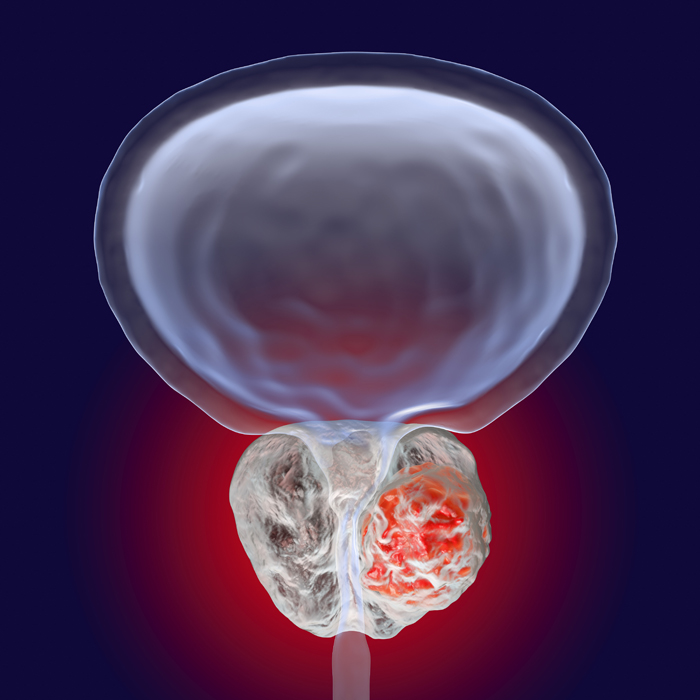Prostate Cancer Treatment in Alwarpet, Chennai
Introduction
The prostate is a small organ located in the lower mid-region of a man's body. It is found underneath the bladder and surrounds the urethra. The hormone testosterone regulates the prostate and causes it to create original fluids, often known as semen. The material containing sperm that exits the urethra during discharge is known as sperm.
It's known as prostate malignancy when an unusual, dangerous growth of cells, also known as a tumor, forms in the prostate. This cancer has the potential to spread to several parts of the body. Because this cancer consists of cells from the prostate, it is referred to as prostate disease in these situations.

What are the Types of Prostate Cancer?
Adenocarcinoma is a kind of cancer that affects the prostate in the majority of cases. This is a cancerous tumor that grows into the tissue of an organ, such as the prostate.
The rapidity with which prostate cancer grows is also a factor. There are two types of changes:
- Aggressive, or growing rapidly
- Non-aggressive or growing slowly
The tumor in non-aggressive prostate disease either does not grow or develops very slowly over time. It can grow quickly with aggressive prostate cancer and spread to the bones and other parts of the body.
What are the Symptoms of Prostate Cancer?
In the early stages of prostate cancer, there may be no signs or symptoms.
Prostate illness that has progressed can manifest itself in a variety of ways, including the following signs and symptoms:
- Peeing inconveniently
- The burst of urine has less force
- Pee with blood
- Semen with blood
- The agony of the bones
- Weight reduces quickly
- Erectile dysfunction
What are the Causes of Prostate Cancer?
The cause of the prostate disease is unknown. It might be caused by various factors, such as a family history of cancer or a propensity for certain synthetics, as with any malignant growths.
Whatever the impelling factor is, it causes prostate cell alterations and unregulated cell development.
When to See a Doctor?
It's a smart thought to call your primary care physician on the off chance that you experience side effects of prostate disease, regardless of whether they're gentle.
As a general guideline, the National Cancer Institute suggests that men in their 30s or 40s see a specialist promptly if they experience any prostate malignancy manifestations.
While these side effects don't demonstrate malignant prostate growth, non-cancerous prostate issues typically happen in men after the age of 50.
Side effects like bleeding release or excruciating pain may warrant a quick malignancy screening.
Request an appointment at Apollo Spectra Hospitals, Alwarpet, Chennai
Call 1860 500 2244 to book an appointment.
How is Prostate Cancer Diagnosed?
The majority of the time, determining whether or not you have prostate cancer is based on your observations. According to the Center for Disease Control and Prevention (CDC) Trusted Source, most prostate cancers develop gradually and do not cause any medical problems.
It's also because the results of the prostate-explicit antigen (PSA) test, which is crucial for screening, might lead to a malignant growth misdiagnosis. Screening might result in needless concern and therapy for each of these reasons.
How Can You Prevent Prostate Cancer?
You can't control certain risk factors for prostate cancer, such as your age. Whatever the case may be, there are those you can deal with.
Stopping smoking, for example, may reduce your risk of prostate cancer, as research has shown that smoking increases your risk. Diet and exercise are two other important factors that might influence your risk of prostate cancer.
How is Prostate Cancer Treated?
Your doctor will develop a treatment plan for your cancer based on your age, health state, and stage of the disease.
If the illness is non-aggressive, your doctor may recommend watchful pause, also known as dynamic observation. This means you'll postpone treatment but continue to have regular checkups with your PCP to monitor the cancer.
More forceful kinds of diseases might be treated with different choices. For example -
- medical procedure
- radiation
- cryotherapy
- Hormonal treatment
- chemotherapy
- stereotactic radiosurgery
- Immunotherapy
On the off chance that your disease is extremely forceful and has metastasized, there's a decent possibility it has spread to your bones. For bone metastases, the above medicines might be utilized, notwithstanding others.
Prostatectomy: A prostatectomy is a procedure in which part or all of your prostate organ is removed. If you have prostate cancer that hasn't spread outside of the prostate, your doctor may recommend an extreme prostatectomy. The whole prostate organ is removed with this procedure.
Conclusion
Prostate cancer is the second most prevalent disease in males, with lung cancer claiming the lives of more men. It has a long preclinical period during which it can be discovered by screening. To keep yourself safe from prostate cancer, you must go in for yearly checkups with your urologist or doctor.
Symptoms of prostate cancer are rare in the early stages. A PSA or automated rectal test is usually used to detect it.
When you're told you have prostate cancer, your natural reaction may be to get it removed right away. However, not all prostate cancers are aggressive, and many do not spread evenly. For certain patients, the best course of action may be maintaining a close check on the condition using an active surveillance method.
After the age of 50, the chances of being diagnosed with prostate cancer increase. Prostate cancer is detected in about six out of ten males over the age of 65.
Symptoms
Our Top Specialities
NOTICE BOARD
CONTACT US
CONTACT US
 Book Appointment
Book Appointment


.svg)
.svg)
.svg)
.svg)








